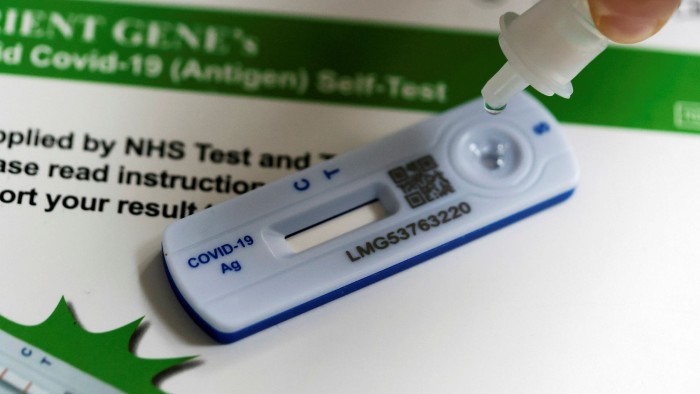Covid self-isolation period to be cut to five days in England

Roula Khalaf, Editor of the FT, selects her favourite stories in this weekly newsletter.
UK health secretary Sajid Javid on Thursday confirmed that the Covid-19 self-isolation period will be cut in England from seven to five full days, following growing pressure from business and health sectors over the impact of Omicron-linked staff absences.
In a statement to the House of Commons, Javid confirmed that from January 17, individuals will be permitted to end their self-isolation after five days, if they have negative lateral flow results on both day five and day six and do not have a temperature.
“From Monday people can test twice before they go, leaving isolation at the start of day six,” he told MPs. “These two tests are critical to these balanced and proportionate plans, and I’d urge everyone to take advantage of the capacity we have built up in tests so we can restore the freedoms to this country while we’re keeping everyone safe.”
Unvaccinated individuals are required to self-isolate for the full 10-day period.
Javid said that data from the UK Health Security Agency showed that about two-thirds of positive cases were no longer infectious by the end of day five.
Under previous government guidance, individuals who had at least two Covid-19 vaccine doses and recorded two negative lateral flow tests on day six and day seven could end isolation early.
Matthew Taylor, chief executive of the NHS Confederation, called the policy change “a pragmatic move”, which the health service “will welcome if it can mean more health and care workers who are well enough can return to the frontline, providing it does not significantly add to the risk of the virus spreading”.
Billy Quilty, an infectious disease epidemiologist at the London School of Hygiene and Tropical Medicine. who has studied the length of self-isolation periods, said the testing requirement meant new isolation edicts were “low-risk”. The US Centers for Disease Control and Prevention also cut the self-isolation period to five days last month but without a testing requirement.
“The beauty of test to release is it’s tailored for each person,” said Quilty, adding it would increase demand for lateral flow tests further.
Business groups welcomed the move. “Today’s announcement marks an important intervention; it’s a relief to see policymakers embrace our recommendation,” said Mike Cherry, chair of the Federation of Small Businesses.
Javid said that, while the NHS would remain under “significant pressure over the next few weeks” and the threat of Omicron remained present, the UK, through its booster programme, testing capabilities and antiviral treatment, was the “freest country in Europe”. “He added: “This country is leading the world in learning to live with Covid.”
The decision comes as England’s health service continues to be blighted by pandemic-related staff shortages, as it grapples with more than 2,000 coronavirus admissions a day and mounting pressures on elective and emergency care.
Some 80,824 NHS staff at acute hospital trusts in England were off work on January 9, about half because of Covid-19 sickness or self-isolation.
Separate NHS data showed that 6m patients were waiting for planned operations and procedures as of November last year, the highest level since records began in 2007. Ambulance call-outs for life-threatening conditions and the number of patients waiting more than 12 hours to be admitted after going to an accident and emergency department also reached record highs.
“Omicron has increased the number of people in hospital with Covid at the same time as drastically reducing the number of staff who are able to work,” said Professor Stephen Powis, NHS England’s national medical director. “Despite this, once again, NHS staff pulled out all the stops to keep services going for patients.”
Separately, on Thursday, Sir Jonathan Van-Tam, England’s deputy chief medical officer, announced he was leaving his government position at the end of March after four-and-a-half years in the role.
Shadow health secretary Wes Streeting also praised Van-Tam, but questioned the timing of his decision amid the fallout from reports of lockdown rule breaking at the top of government in 2020.
However government insiders insisted the two events were not related.
Van Tam joined the health department on secondment from the University of Nottingham in 2017 and will return as pro-vice-chancellor for the faculty of medicine and health sciences in the spring.
Comments